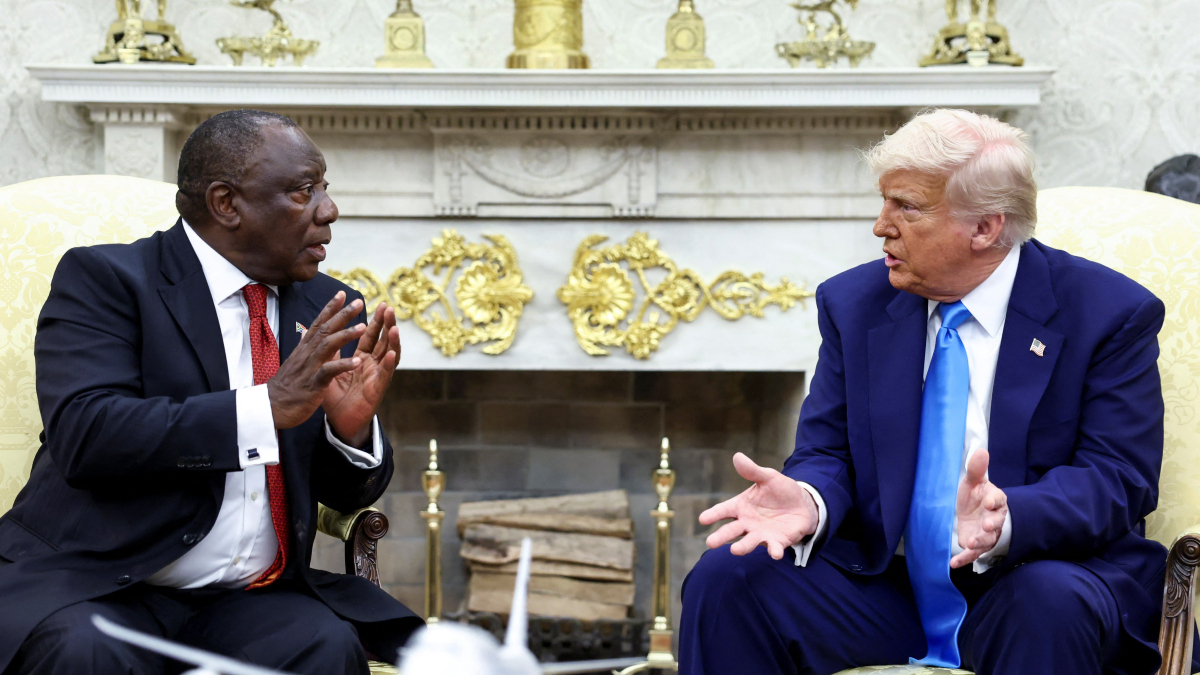Trump envoy says president is puzzled Iran has not shifted nuclear stance
U.S. President Donald Trump is weighing why Tehran has not moved toward limiting its nuclear programme even as Washington expands its military presenc...

A simmering diplomatic feud between Washington and Pretoria has erupted into a full-scale crisis, with South African President Cyril Ramaphosa describing U.S. President Donald Trump’s decision to ban South Africa from the 2026 G20 summit as "regrettable" and based on "misinformation."
The dispute centers on the just-concluded G20 summit in Johannesburg—the first ever held on African soil—which President Trump boycotted. In a social media post on Thursday, Trump announced that South Africa would be excluded from next year's gathering in Miami, Florida, alleging that Pretoria had "refused" to formally hand over the G20 presidency to the United States.
"At my direction, South Africa will NOT be receiving an invitation to the 2026 G20," Trump wrote on Truth Social, threatening to sever financial aid.
South Africa’s presidency hit back, clarifying that because no high-level U.S. delegation attended the Johannesburg summit, the ceremonial gavel was handed to a U.S. embassy official instead.
"If visas are denied, well, then we will have to move on and look beyond the G20 in the U.S.," presidential spokesman Vincent Magwenya told the BBC, acknowledging that a "reset" in relations now seems impossible.
Unprecedented Exclusion
Trump’s threat to exclude a G20 member challenges the foundational rules of the group. Unlike the G7, which is a coalition of like-minded allies, the G20 is a forum of the world’s largest economies, regardless of political alignment.
While there is no formal mechanism to "uninvite" a permanent member, the host country controls border access. By threatening visa restrictions, the U.S. could effectively block the South African delegation, a move that would likely trigger a boycott by other nations, particularly members of the BRICS bloc (Brazil, Russia, India, China, and South Africa).
This move echoes the diplomatic isolation of Russia in recent years, though even then, diplomatic channels were often kept open. Applying such measures to South Africa, a leading voice for the "Global South," marks a significant escalation.
The ‘White Genocide’ Narrative
The friction is fueled by President Trump’s repeated engagement with the controversial "white genocide" narrative regarding South African land reform.
Trump justified his boycott by citing widely discredited claims that the South African government is orchestrating large-scale killings of white farmers. "They are killing white people and randomly allowing their farms to be taken," Trump wrote Wednesday.
While South Africa struggles with a high violent crime rate that affects all racial groups, farm murders have actually declined from their peaks in the early 2000s. The government has consistently rejected the "genocide" characterization as right-wing propaganda designed to destabilize the country's post-apartheid transition.
The AGOA Threat
The most tangible threat in Trump’s statement was the "stop to all payments and subsidies," a clear reference to the African Growth and Opportunity Act (AGOA).
AGOA provides duty-free access to the U.S. market for qualifying African nations and is a cornerstone of South Africa’s export economy, particularly for its automotive and agricultural sectors. Losing AGOA status would cost South Africa billions in revenue and thousands of jobs.
Relations have been deteriorating for years. Washington has been increasingly frustrated by South Africa's non-aligned stance on the Ukraine war, its deepening naval ties with Russia and China, and its leadership in bringing a genocide case against Israel at the International Court of Justice (ICJ) regarding the conflict in Gaza.
A Fractured Summit
The Johannesburg summit itself was a contentious affair. Despite the U.S. boycott, the summit concluded with a joint declaration on climate change and economic inequality.
However, the U.S. State Department has accused South Africa of "weaponizing" its presidency to push an anti-Western agenda. Ramaphosa dismissed this, stating the U.S. absence was "of its own volition."
"We should by now accept," Magwenya noted, "that there won't be a reset of the relationship."
A seven-month-old Japanese macaque has drawn international attention after forming an unusual bond with a stuffed orangutan toy after being rejected by its mother.
Quentin Griffiths, co-founder of online fashion retailer ASOS, has died in Pattaya, Thailand, after falling from the 17th floor of a condominium on 9 February, Thai police confirmed.
Divers have recovered the bodies of seven Chinese tourists and a Russian driver after their minibus broke through the ice of on Lake Baikal in Russia, authorities said.
Ukraine’s National Paralympic Committee has announced it will boycott the opening ceremony of the Milano Cortina 2026 Paralympics in Verona on 6 March, citing the International Paralympic Committee’s decision to allow some Russian and Belarusian athletes to compete under their national flags.
President Donald Trump said on Saturday (21 February) that he will raise temporary tariffs on nearly all U.S. imports from 10% to 15%, the maximum allowed under the law, after the Supreme Court struck down his previous tariff program.
U.S. President Donald Trump is weighing why Tehran has not moved toward limiting its nuclear programme even as Washington expands its military presence across the Middle East.
Comments by U.S. Ambassador to Israel Mike Huckabee suggesting that Israel had a biblical right to much of the Middle East drew condemnation over the weekend from countries across the region, which described the remarks as “dangerous and inflammatory”.
Brazilian President Luiz Inácio Lula da Silva has said he will urge U.S. President Donald Trump to avoid a "new Cold War" when the two leaders meet in Washington next month.
Russia launched overnight drone and missile strikes across Ukraine, targeting energy infrastructure in multiple regions, Ukrainian authorities said on Sunday (22 February).
U.S. President Donald Trump said he plans to send a hospital ship to Greenland, working with Louisiana Governor Jeff Landry. He announced the move in a social media post shortly before meeting Republican governors in Washington.
You can download the AnewZ application from Play Store and the App Store.

What is your opinion on this topic?
Leave the first comment